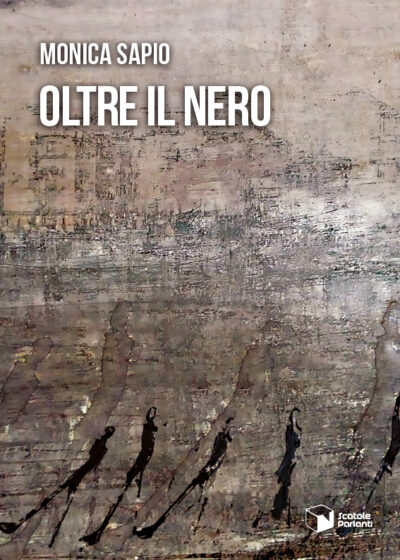WRITING AS A THRESHOLD BETWEEN TWO WORLDS

Some books resist easy classification. Beyond the Black, by Monica Sapio — an anesthesiologist and intensive care physician working in Palermo — is one of them. It is not a medical memoir, despite the current trend; it’s not a novel in the strict sense, nor a short story collection. And yet, it’s a bit of all these things — and much more. It is a lyrical, almost dreamlike narrative that follows a woman, Andrea Pasìo, returning to Palermo, the city of memory and possibility.
In this emotionally resonant homecoming, Monica Sapio introduces a fascinating choral figure: the Chorus. A hybrid narrative presence, the Chorus is at once conscience, commentary, memory, and irony. It steps into dialogue, reflects and disrupts, observes and comforts. It is the counterpoint to Andrea’s interior life, the echo of her contradictions. It says things like, “The mistakes you scattered along the way make the road recognizably yours,” or “The fourth glass is for madness,” acting as both mirror and challenge, as in Greek tragedy or certain lucid dreams.
At the heart of the book lies this dissonance between the clinical harshness of the medical profession and the poetic lightness of writing. Monica Sapio deliberately chooses not to recount intensive care. There are no wards, monitors, or emergencies. Yet that world hovers like a dense shadow: the “black” of the title is not death, but a threshold. It is what one glimpses when the eyes close, when a body is anesthetized, when the mind is plunged inward to protect and preserve it.
The black is also the backdrop from which Palermo re-emerges — described with sweetness and intensity, made of neighborhoods, theaters, cafés, blurred lights, and lost voices. The city is both protagonist and stage, living body and symbol: “Palermo is beautiful. Isn’t that, right? Beautiful and difficult, like a woman,” says a boss in the prologue. Transfigured into an urban myth, Sapio’s Palermo is populated by memories that never fade and ghosts that won’t be forgotten.
Andrea, the protagonist, returns from Rome for a position at the anti-mafia prosecutor’s office. But the journey she undertakes is primarily inward, moving backward through time: her childhood, family trauma, her friend Gabriella, the mysterious “accident” involving her father. She travels between the present and past, between dream and wakefulness, between reality and vision. She is a liminal character, a threshold heroine. She has no fixed identity: she is a prosecutor, daughter, sister, orphan, friend, survivor. Like Ulysses, she returns both to recognize and to lose herself. Nostos, yes — the return — but also an exodus.
Beyond the Black is not a book “about medicine,” but a book by a healer who writes. And this distinction is fundamental. Writing is not used to describe her job, but to balance it. It is a space apart, a descent, a way to preserve what the hospital cannot contain. Pain, shame, anger, unspoken love, guilt, the need to rewrite — all this flows onto the page with restraint and precision.
Sapio confirms what many suspects and few can prove: a good doctor can be a great writer — not because they narrate what they have seen, but because they understand what they’ve kept silent. They know where the word breaks, where silence itself becomes narrative. In her writing, every sentence has weight, every image steps back. There is no rhetoric, no self-indulgence. Only care and attention. The brief form, the evocative detail, the smallest gesture takes center stage.
The rhythm is slow but never static. The fragments — some like mental photographs, others like lucid dreams — compose an existential logbook. Andrea wanders through the city, and in her wandering, the author’s Palermo takes shape: it breathes, consoles, stings. It is not just a backdrop — it is a living body, with “the scent of jasmine,” with “the sound of the cliffs cutting everything else away.”
At times, especially in the most intimate passages, the narrative becomes aphoristic, as when Andrea says: “I feel clean, ready for what I’ve been called to.” And the Chorus immediately responds: “If you’re aware that you lose your balance while moving forward, you can find the courage to run.”
Here, then, is Palermo at twilight, in a scene of poignant suspension:
Andrea walked along Via Roma. The Chorus danced around her, silent and present. “Every return is an atonement,” it whispered within her. But she had no more sins to atone for, only ghosts to pass through. In front of a bar, the smell of freshly baked bread. She mentally wrote: “That darkness is a guardian, not an enemy.” And in the blackness of her gaze, an undefined light gleamed.
And so the Chorus exits the predictable Tragedy of the Return.
Link to the book (in Italian) ›› Oltre il nero – Scatole Parlanti
